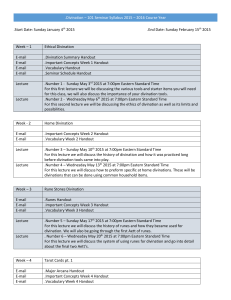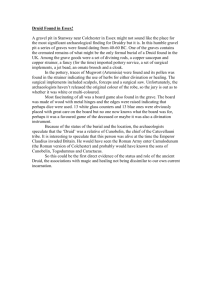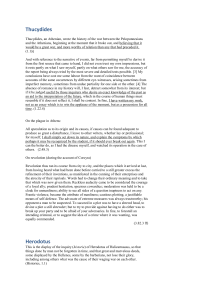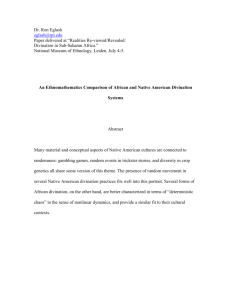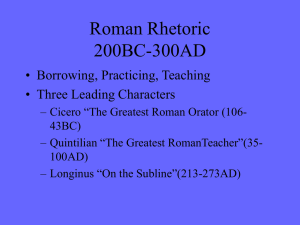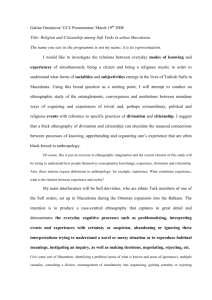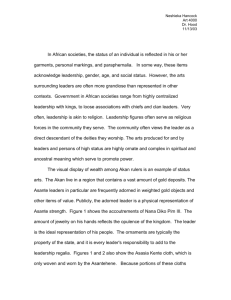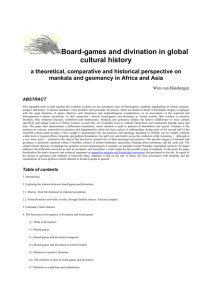Outline of de divinatione
advertisement
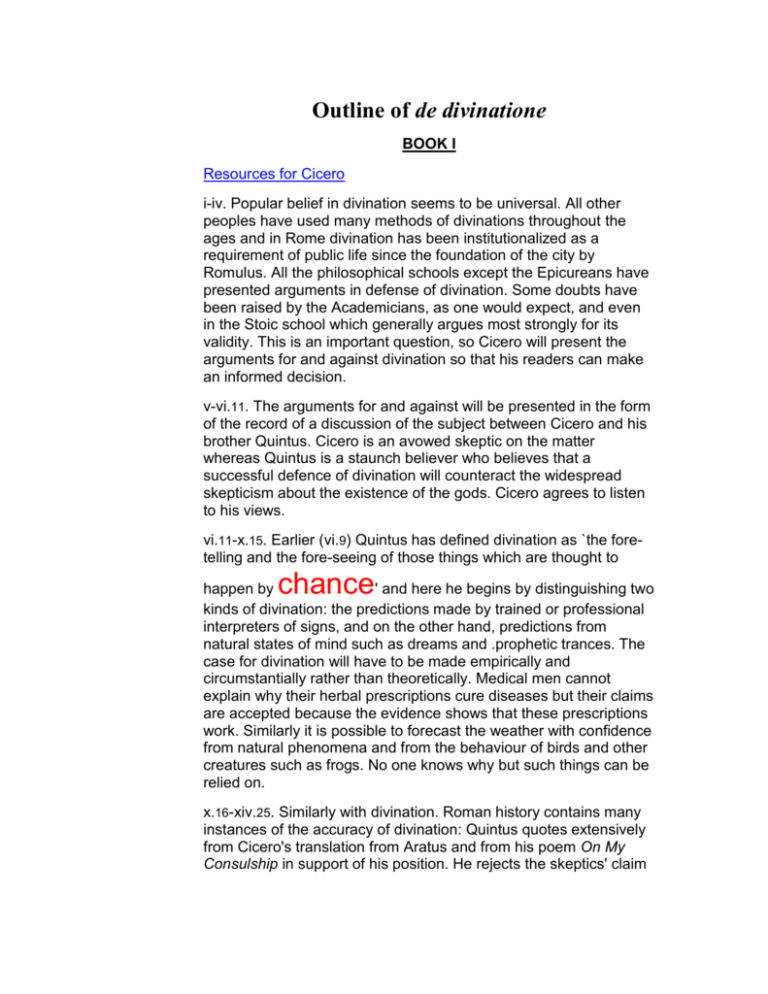
Outline of de divinatione BOOK I Resources for Cicero i-iv. Popular belief in divination seems to be universal. All other peoples have used many methods of divinations throughout the ages and in Rome divination has been institutionalized as a requirement of public life since the foundation of the city by Romulus. All the philosophical schools except the Epicureans have presented arguments in defense of divination. Some doubts have been raised by the Academicians, as one would expect, and even in the Stoic school which generally argues most strongly for its validity. This is an important question, so Cicero will present the arguments for and against divination so that his readers can make an informed decision. v-vi.11. The arguments for and against will be presented in the form of the record of a discussion of the subject between Cicero and his brother Quintus. Cicero is an avowed skeptic on the matter whereas Quintus is a staunch believer who believes that a successful defence of divination will counteract the widespread skepticism about the existence of the gods. Cicero agrees to listen to his views. vi.11-x.15. Earlier (vi.9) Quintus has defined divination as `the foretelling and the fore-seeing of those things which are thought to chance happen by ' and here he begins by distinguishing two kinds of divination: the predictions made by trained or professional interpreters of signs, and on the other hand, predictions from natural states of mind such as dreams and .prophetic trances. The case for divination will have to be made empirically and circumstantially rather than theoretically. Medical men cannot explain why their herbal prescriptions cure diseases but their claims are accepted because the evidence shows that these prescriptions work. Similarly it is possible to forecast the weather with confidence from natural phenomena and from the behaviour of birds and other creatures such as frogs. No one knows why but such things can be relied on. x.16-xiv.25. Similarly with divination. Roman history contains many instances of the accuracy of divination: Quintus quotes extensively from Cicero's translation from Aratus and from his poem On My Consulship in support of his position. He rejects the skeptics' claim chance that this can be explained by mere . Divination is like other human arts such as medicine and navigation: each has its recorded failures and mistakes but in general their success far outnumber these and, as a result, men justifiably trust in them. xv.25-xvii.30. Quintus draws on instances of disaster in Roman history when the signs were ignored to demonstrate the validity of the augur's art. xvii.30-33. Quintus relates story of the origin of augury and cites instances of its prestige. xviii.34-xix.37. Quintus repeats the distinction between "skillful" divination based on observation, reason and learning and "natural" divination derived spontaneously from states of high emotion or derangement. Among the latter he includes dreams, fits of prophetic madness and inspired oracles and, perhaps, some longestablished lot-casting rituals. In defence of "skillful" divination he asserts that it can be rejected only by stigmatising as madness the learning of the Etruscans, the Babylonians and the experience of authoritative figures of history. xix.37-xxx.65. Quintus deals at length with natural divination in dreams and draws on Greek and Roman literature and history and on his own and on his brother's experiences to demonstrate its validity. The prophetic vision of some at the time of their death is a form of "natural" divination comparable to dreams. xxxi.65-xxxii.71. Language itself and personal experience make clear that the human soul has a "natural" power of prediction and our [Peripatetic] friend Cratippus provides a scholarly explanation in which this power is evidence of the origin of the human soul in the divine soul. xxxiii.72-xxxvi.79. Quintus defines "skillful" divination as based on conjecture and learning and as including inspection of the entrails, augury and interpretation of dreams. Historical instances of conjectural divination are given. xxxvi.79-xl.87. All philosophies except Epicureanism and the universal belief and practice of mankind support "skillful' divination and radical scepticism can be refuted by the historical record. xl.87-xlii.94. Quintus draws on literature and on travelers' accounts of other peoples to maintain that all peoples practice "skillful" divination and adopt the method of divination most appropriate for their life-styles and traditions. xliii.95-xlviii.109. All the great states of history have made use of "skillful" divination and Quintus draws examples from Athenian, Spartan and Roman history. In particular he discusses the use of the Sybilline books, the learned interpretation of omens and augury in Roman history and life. "Skillful" divination relies on tradition and experience in line with all the other arts and intellectual pursuits. xliii.110-li.115. "Natural" divination occurs in trances and dreams and is a manifestation of the omnipresence of the divine in the cosmos, whereas the predictions of philosophers and scientists which are based on their expertise are not to taken as instances of divination. li. 116-lv.125. Quintus uses Stoic cosmological ideas to argue that the "signs" are the manifestation of the providential presence of the divine. He cites examples from Roman history: even one incontestable instances of accurate prediction through divination is enough to prove its reliability. lv.125-lvi.128. Posidonius identifies three sources of divination: the divine, which Quintus says has been the subject of his case up to this point, Fate and Nature. He makes the case for a rational belief that all things are controlled by Fate. Only a god can know Fate but human beings can get a glimpse of the future through both kinds of divination. lvii.129-131. Sleep which Nature provides reveals the prophetic power of the soul when it is released from the influence of the body. The signs on which "skillful" divination depends can be shown to have their origin in Nature. After rejecting fortune tellers and professional mediums as either criminals or obsessed with superstition, Quintus rests his case. BOOK II i.-ii. 7. Cicero explains the origin and purpose of his Philosophica. iii.8-v.12. Cicero begins his reply to Quintus by stating bluntly that he does not believe in divination. He argues that, in the most important areas and activities of life such as philosophy, medicine, politics, navigation, to call on divination would be not merely foolish but, in some circumstances, would be dangerous. v.13-vii. 19. Qintus, definition of divination as the prediction of events which occur by " chance" is a self-contradiction. viii.20-21. If everything is predetermined by Fate, divination is meaningless and useless. ix.22-x.26. Knowledge of the future is a disadvantage to the individual, since it deprives him of peace of mind in the present. xi.26-27. Cicero summarizes Quintus' argument. xii.28-xvii.41. In public Cicero supports divination in the interests of the state religion but in private he can be more frank. Cicero discusses divination by inspection of the entails of sacrificed animals. While He concedes that there is an interconnectedness between elements and events in the natural world, he denies that their can be any credible connection between the internal organs and the kind of predictions which are often made, e.g., the finding of a treasure. He scoffs at Stoic assertions that this is brought about by divine good-will and providence. xviii.42-xxi.49. Divination through lightnings. There is a valid scientific explanation for lightning which renders divination by that means absurd. xxii.49-50. Portents-occurrences of the "impossible"-cannot be prophetic because they are not in fact "impossible", they are merely unusual. xxiii.50-xxxv.76. Cicero examines the record of divination in Roman history and concludes that, while at the beginning divination was believed in, it was maintained later only because of its political usefulness. xxxvi.76-xxxviii.83. The practice of divination by the different nations and peoples is so diverse and so contradictory that it confirms the idea that it is a combination of superstition, expediency and deceit. xl.83-84. If everything can be interpreted as a sign, then nothing means anything. xli.84-87. Absurdity of casting of lots. xlii.87-xlvii.99. Absurdity of astrology. Cicero relies on rational arguments, e.g., the differences in character and careers of twins, and on the record of failed predictions. xlviii.100. Cicero proposes to discuss divination by possession and through dreams [Quintus's "natural" divination]. xlix.101-liii-109. Cicero rejects the Stoic idea that the omnipresence and the providence of the divine guarantee the validity of divination. liv.110-lxxii.150. Absurdity of divination by possession and through dreams. Cicero's underlying assumption is that, in a rational, orderly cosmos, belief in divination by non-rational, if not irrational, means is an absurdity.

